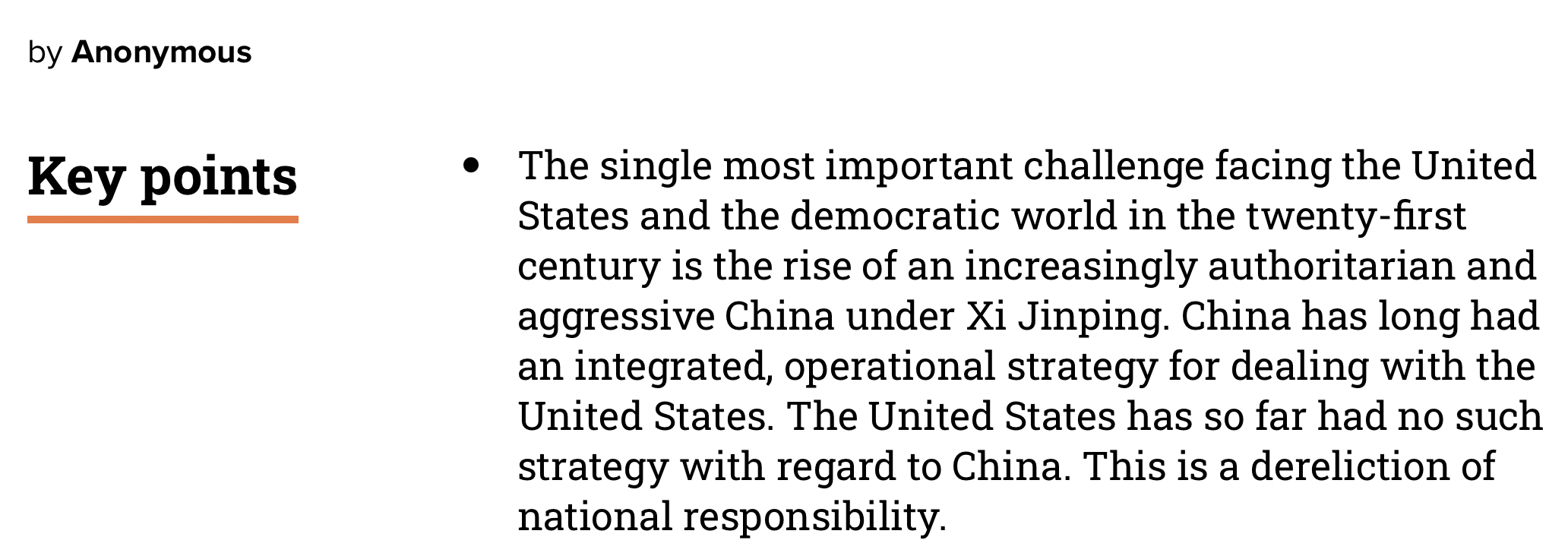The Atlantic Council’s Anti-China Containment Strategy

All Global Research articles can be read in 27 languages by activating the “Translate Website” drop down menu on the top banner of our home page (Desktop version).
***
What the Atlantic Council doesn’t realize is that its unnamed author’s visceral hatred for the Chinese President is actually a powerful endorsement of his leadership successes.
The Atlantic Council, one of the US’ most powerful think tanks, published an extremely provocative anti-Chinese containment strategy proposal titled “The Longer Telegram: Toward a new American China strategy”.
The title is purposely meant to evoke historical comparisons to George Kennan’s “Long Telegram” which set the stage for the US’ decades-long containment strategy against the former Soviet Union.
Its author remains anonymous per their request, but their highly detailed document has already generated significant attention across America’s leading policy circles. The problem, however, is that it’s doomed to fail if implemented.
Screenshot Atlantic Council Report
The strategy’s primary theses are several-fold:
- the US must retain self-belief in its global supremacy in all respects;
- America must assemble a global coalition to contain China;
- China must be forced to incur significant costs for refusing to abide by Washington’s envisioned liberal international order;
And the consequences of these aggressive actions must be exploited for the purpose of dividing and ruling the Communist Party of China (CPC) so that they replace President Xi Jinping and transition to a collective leadership model that the Atlantic Council believes will agree to submit to America’s will.
That final goal is nothing but a political delusion.
Some of the proposals to these ends are equally unrealistic. One of the organizing principles states that the US must rebalance its relations with Russia in order to divide it from China and provoke a security crisis along their shared border. A ridiculous red line is also suggested to make China responsible for any attack that the Democratic People’s Republic of Korea (DPRK) might launch against its neighbors. On the topic of major national concerns, the US is encouraged to support India should its economic and/or military relations with China worsen. In other words, the Atlantic Council wants to revive the era of proxy warfare.
With that in mind, the mysterious author of “The Longer Telegram” implores his country to clinch mega trade pacts with the Asia-Pacific and EU in order to compete with China in a clear allusion to Beijing’s recently agreed Regional Comprehensive Economic Partnership (RCEP) and Comprehensive Agreement on Investment (CAI) respectively.
They also propose scaling investment into the World Bank and regional development banks as a means of countering Beijing’s Belt & Road Initiative (BRI). In addition, there’s a strong appeal to double down on information warfare activities against China in what’s described as “the global battle for ideas”.
Most ominously, however, is the innuendo that a physical battle between China and the US might soon be in the cards, perhaps over the renegade island province of Taiwan, the South China Sea, or the Diaoyu Islands. The Atlantic Council speculates that China might not achieve a conclusive victory if the US militarily intervenes in any of these scenarios, which they claim would in turn diminish President Xi’s legitimacy.
It’s not directly stated in the text, but the author strongly hints that a limited hot war between the two without any clear victory on China’s part could trigger the CPC intra-party coup against President Xi that they’re hoping for.
None of these proposals are all that novel, but the difference between this comprehensive set of them and others is the focus on trying to provoke regime change within the CPC against President Xi. The unnamed author even absurdly suggests that this might happen during next year’s Twentieth Party Congress. In order to improve the US’ odds of more effectively manipulating elite party officials to that end, the Atlantic Council proposes that “the public language and operational focus must be ‘Xi’s Communist Party’”, not the CPC in general. This is because the entire strategy is basically all about demonizing the Chinese leader himself.
What the Atlantic Council doesn’t realize is that its unnamed author’s visceral hatred for the Chinese President is actually a powerful endorsement of his leadership successes.
He’s personally credited with defending China’s interests in all respects, which is of course portrayed in a highly negative way from the American grand strategic perspective. That said, while President Xi is at the core of the CPC, there are still approximately 91 million other people in the party who represent the over 1.3the longer billion citizens of China. The country’s recent ascent as one of the planet’s most influential forces in history is due to their collective efforts, not just one single man’s.
This makes the Atlantic Council’s strategy document inherently flawed since it strangely presupposes that President Xi’s countless successes aren’t popular at home, whether among average Chinese or the CPC elite.
It also imagines that the US is still seen as the “city upon a hill” by the international community, not realizing that the majority of people actually perceive it as a spooky castle inhabited by the ghosts of imperialism’s past than any sort of inspiration to follow. In the dangerous event that elements of this policy are implemented, they’re doomed to fail and accelerate the US’ global decline, but it might temporarily unite its fractured political class.
*
Note to readers: please click the share buttons above or below. Forward this article to your email lists. Crosspost on your blog site, internet forums. etc.
This article was originally published on OneWorld.
Andrew Korybko is an American Moscow-based political analyst specializing in the relationship between the US strategy in Afro-Eurasia, China’s One Belt One Road global vision of New Silk Road connectivity, and Hybrid Warfare. He is a frequent contributor to Global Research.
Featured image is from OneWorld


